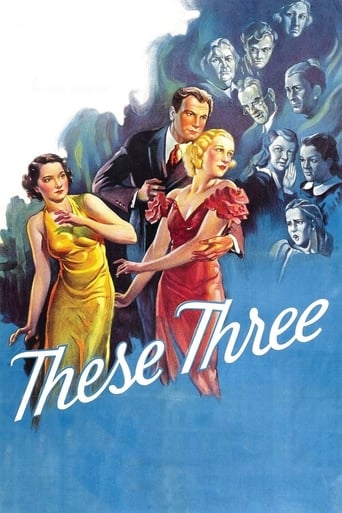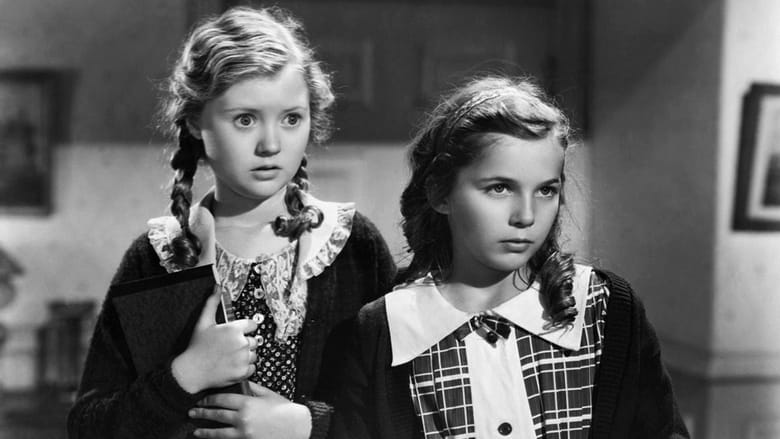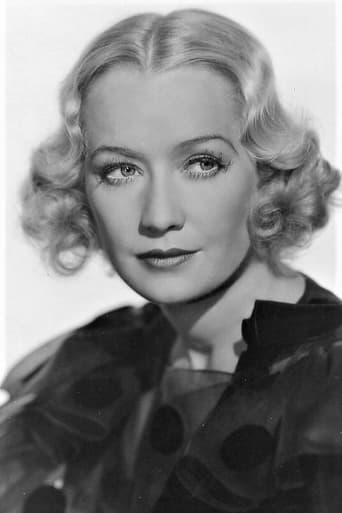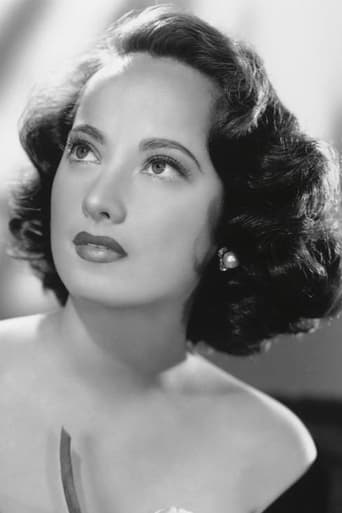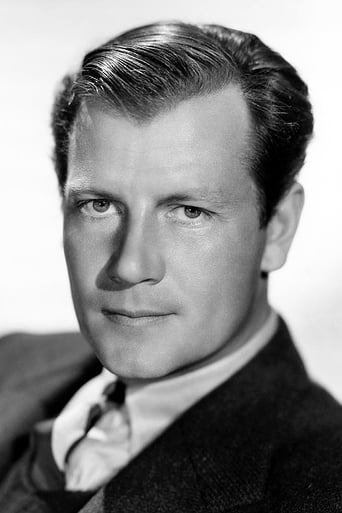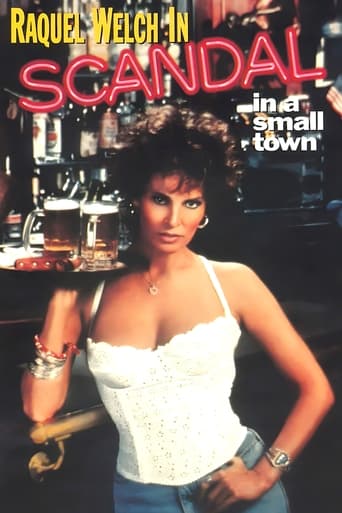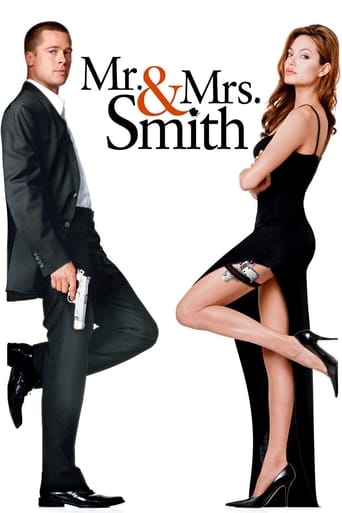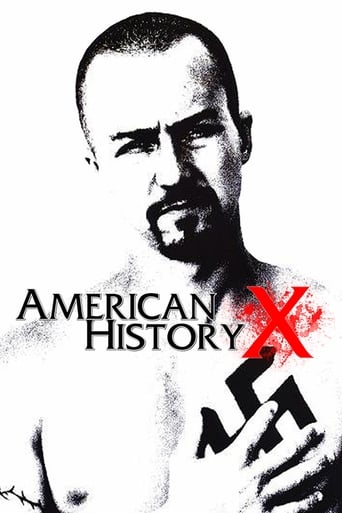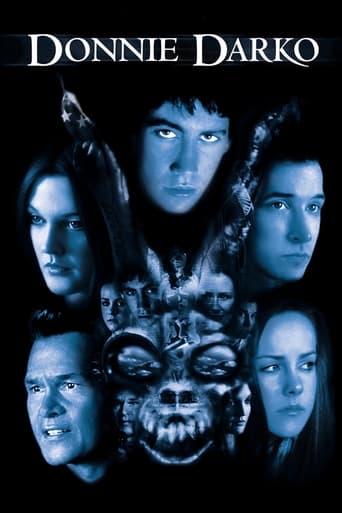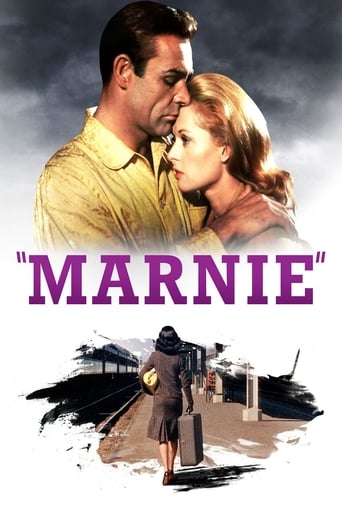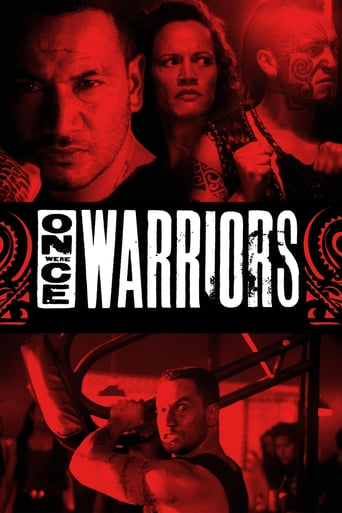These Three (1936)
Martha and Karen graduate from college and turn an old Massachusetts farm into a school for girls. The friends are aided in their venture by local doctor Joe Cardin, who begins a relationship with Karen, and a prominent woman whose granddaughter, Mary, later enrolls in the new school. Mary soon reveals herself to be a spiteful child and tells a scandalous lie about Martha and Joe that threatens to destroy the lives of all involved.
Watch Trailer
Cast


Similar titles
Reviews
The relationship between censorship and creativity can be summed up no better than in "The Producers," when Gene Wilder is going insane and Zero Mostel throws the bucket of water on Wilder to calm him down, only to make Wilder more insane. "These Three," based on a play by Lillian Hellman (who also wrote the screenplay), is the story of two debutantes, Karen Wright and Martha Dobie, (Merle Oberon and Miriam Hopkins) fresh out of school who--almost immediately--inexplicably decide to start their own school (studies do say the public school system is built to churn out teachers). At the building where the two women wish to house their school, they meet Joe Cardin (Joel McCrea) who assists them in their endeavor. He makes three. They all become great friends, open the school to resounding success and everything is just hunky-dory.As usually happens, children ruin everything--in this case, one child: Mary (Bonita Granville). To understand Mary, one must simply imagine Iago as a young girl--afraid? Mary, because she's spiteful, young and doesn't understand consequences, spreads a lie about her teachers in order to take the attention away from her own misbehavior. So what is initially a private, mild, unacted-on love triangle--that probably would never have amounted to anything and fizzled away with time--becomes the business of the entire town.The original play had Mary's lie alluding to a lesbian relationship between the two friends; however, due to that pesky Hays Code, McCrea's character was conceived, and the lie turned into one of heterosexual deviance, though even that is tiptoed around. Despite the changes to the source material, the film never feels watered down, as the contents of the lie really aren't that important, at least not as much as the subsequent reverberations. Plus, by not mentioning specifics, it almost makes the whole thing more potent, as the viewer's imagination is given free rein. The example often referred to in is from "Shane," and the intense sexual tension between the titular character and the boy's mother, despite never showing anything. In this way, censorship becomes creativity's unlikely accomplice. As weighty as the film is, it's surprisingly funny. In particular, Martha's aunt, Lily Mortar, (Catherine Doucet), who is a haughty, loquacious, former actress. She reminded me of one of Dickens' over- the-top aristocratic characters. When a taxi driver (played by Walter Brennan, who, I guess, got tired of driving stagecoaches) requests his pay, Mortar merely chides him on his obsession with money.William Wyler's "These Three" is an excellent adult drama that hasn't aged a bit (well, maybe a little bit). Not a single performance fails to impress--particular Granville's as Mary, a tough part for a child actor--and the comedy--which is a gamble in a dramatic film, for it runs the risk of deflating the whole thing-- feels completely natural. Few films I've seen handle the concept of mob mentality better than this one. My one gripe--and I had this with the recent "The Hunt"--is who are these adults that take everything a child says as indisputable fact? Use your brain.Lastly, how cool is that poster?
Two friends (Miriam Hopkins and Merle Oberon) open up a school to teach young girls. Along the way Oberon falls for a handsome young doctor (a ridiculously pretty Joel McCrea). Unfortunately there's an evil young woman in school (Bonita Granville) who spreads a lie saying that Hopkins and McCrea are lovers behind Oberon's back...and their lives are destroyed.Cleaned up version of "The Children's Hour" by Lillian Hellman. In the original play the two women were accused being lesbians...but that couldn't be done on the screen in 1936 so they turn it into a love triangle. The play was filmed faithfully in 1962 by the same director. Still this movie is very good on its own. The dialogue is almost identical to the play with minor changes. The acting is great, it moves very quickly, McCrea is impossibly handsome and it just draws you in. Well-directed too. The 1962 version (under "The Children's Hour" title) is good too but this is well worth seeing. Recommended.
"These Three" is taken from the play "The Children's Hour" and follows two friends, Martha (Miriam Hopkins) and Karen (Merle Oberon), who graduate from college and go to and old farm Karen's family owns and fix it up, with intentions of making it a school for young ladies. They meet, Joe Carden (Joel McCrea), a handsome doctor, and he falls in love with Karen, but Martha also falls for him, but it is unrequited. Joe and Karen eventually get engaged. The women open up their school, and with the help of Martha's gossipy Aunt Lily (Catherine Doucet), it become a success. There is however a ghastly little girl at the school named Mary Tilford, played eerily by Bonita Granville, who proves to be a problem when she formulates a lie about Martha and Joe, and it spirals out of control. The play the film was based on featured a rumor about lesbianism, but in 1936, with the Hays Code in full affect, that could not be done, so the play's author wrote this script instead. The changing of the rumor does not effect the message of the story, but the film would not have been what it was, had it not been for it's stellar cast. Alma Kruger is a strong presence as Mary Tilford's grandmother, and you really feel for her character by the end. Walter Brennan and Margaret Hamilton round out the cast in small roles, Brennan as a comic relief cab driver, and Hamilton as the maid at the Tilford home. Hopkins, Oberon, and McCrea all turn in wonderful performances, but it is Granville and young Marcia Mae Jones as the other main young girl, Rosalie, who truly hold their own with the pros. Granville, who was nominated for a Best Supporting Actress Oscar, was only 13, and Jones only 12 when production transpired on "These Three" and their performances are very impressive.The film does a fairly good job of not being melodramatic. There are some schmaltzy lines here and there, but for the most part it it a gripping and well acted drama.
This movie was directed by William Wyler and he also directed a remake in 1961 that was actually better than this one. This version stars Merle Oberon and Miriam Hopkins as friends who open a school for young girls. Joel McCrea is a local doctor who loves Oberon and they get engaged but Hopkins loves him too and they don't know. Bonita Granville is a spoiled brat at the school who hates to be punished so she decides to get back at Oberon and Hopkins. Granville finds out Hopkins loves McCrea and she starts a rumor that Hopkins slept with McCrea and everyone finds out and takes their kids out of the school. In this version they leave out the part about them being lesbians like they had in the remake and this version has a much more upbeat ending then the remake.

